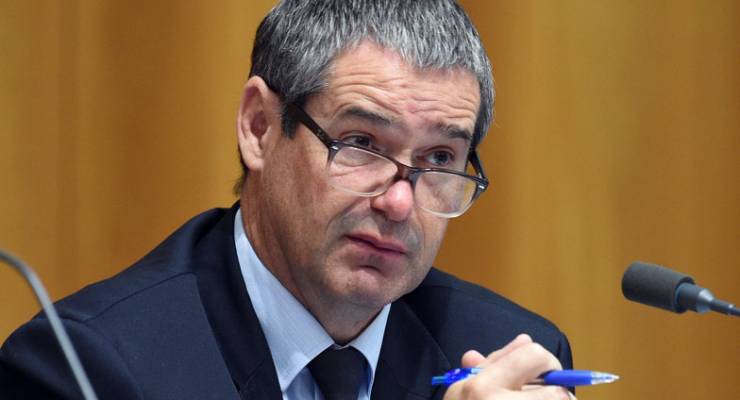
The thing to understand about Labor Senator Stephen Conroy, who has called time after 20 years in the Senate, is that he loved a blue. Politics was about conflict, about winning battles, defeating opponents.
He was famously labelled a “factional Dalek” by Victorian Labor heavyweight Robert Ray — lumped into that category with his long-time opponent from the left, Kim Carr (and an appropriate insult, given Conroy’s dedication to Dr Who). That might have suggested Conroy was only about internal warfare and the kinds of factional and intrafactional brawling that marked the ALP. But Conroy’s love of battle, and his desire to win, meant he was formidable on policy. He was only briefly my portfolio minister before I left the public service in 2008, but he was the best-prepared, best-informed communications minister I’d seen. He understood the technology and, as importantly, he had thought hard about the impact of technology on employment, on communities, on people’s lives.
That didn’t mean he was by any stretch a tech enthusiast. As minister, he rapidly became notorious within the IT community for Labor’s internet filtering policy (he had an extended stoush in Crikey with me about it). Many in the sector were puzzled by why such a well-informed and intelligent bloke would so enthusiastically support a censorship policy — many suggested he personally opposed the policy but was implementing it because Kevin Rudd — famously a Christian — wanted it. Conroy could have played along with that with a wink and a nod, but he was having none of it: he prosecuted the case for internet censorship ferociously, rejecting any suggestion there were differences between himself and Rudd — a prime minister he would go on to damn as a disaster.
And he understood his portfolio well enough to be entirely unfazed by the arrival of Malcolm Turnbull as shadow communications minister. Turnbull had not merely been a frontline player in the media ownership battles of the 1980s but, famously, made over $50 million from his stake in Ozemail. Within hours of Turnbull’s appointment, Conroy was mocking him as “a merchant banker of a dial-up company.”
Turnbull endlessly mocked Conroy, both in opposition and in government, for the failings of the NBN roll-out and the eccentricities of “Conrovian” policy, but it’s hard to avoid the impression that Conroy has had the last laugh: the NBN in its Turnbull mode is now widely regarded as a debacle, costing every bit as much and taking every bit as long as the Labor model but with inferior technology and slower speeds.
In opposition, Conroy moved to defence, where with his usual boots’n’all style he remorselessly pursued the Abbott government over the offshore construction of the new generation of Royal Australian Navy submarines. But he remained Labor’s point man in the Senate on the NBN, and took huge delight in pursuing the unfolding problems of the Turnbull-era NBN Co. After the July election, he was moved to Special Minister of State — he sought the lower-profile portfolio, he says; colleagues say it was apparent from then that he was planning to leave.
In his final speech — tabled rather than read last night so that it slipped entirely under the radar — he noted that he, Stephen Smith and Wayne Swan had once been labelled “the three roosters” (by their enemy Mark Latham). Smith left federal politics in 2013 and had a disastrous and abortive flirtation with the WA Labor leadership earlier this year. Swan is likely in his last term in Parliament, and Conroy has now moved on. Conroy was the most aggressive of them, and in losing him Labor will lose some of the mongrel necessary in all successful oppositions.








Conroy’s departure will be a loss. As Communications Minister he had a solid grasp of his portfolio – unfortunately the NBN delays undermined his position. He must be greatly relieved (delighted?) that the current woeful version of the NBN will forever be associated with Abbott/Turnbull.
Conroy is one of the few politicians who have a backbone, they seem to be an endangered species.
If it wasn’t for such a concerted input from Conroy most of us would probably have never heard of Steve Fielding?
Remember Kemalani; Bill Shorten does! No Australian will gain the keys to the Lodge and if they do, stay in power if members of their team threaten America’s strategic interests!
I do not see as a virtue the dogged promulgation of something one does not believe in – esp when it is a dumb idea.
Hope he enjoys the gold plated pension & perks.
Conroy will be remembered as a visionary for his NBN plan and in contrast Turnbull will be seen as the idiot he is